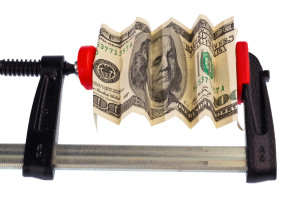Budget shortfall may scuttle governor’s plans to boost education funding

CRUNCH: Pennsylvania’s revenue shortfall will put a crunch on Gov. Tom Corbett’s budget.
By Maura Pennington | Watchdog.org
PHILADELPHIA — A $600 million shortfall could jeopardize Gov. Tom Corbett’s plans to spend more on public education next year.
In his proposed fiscal 2014-15 budget, Corbett called for $387 million in new spending on schools, mostly in the form of targeted grants. But Pennsylvania’s revenue numbers have not met expectations, leaving the state with a deficit of more than $500 million, which must be filled before new spending can be considered.
Two months remain in the fiscal year, but they are unlikely to help the bleak budget picture. The Independent Fiscal Office last week projected a year-end deficit of $608 million.
For now, the administration is sticking to its guns.
“The governor continues to emphasize the importance of education and increasing student achievement,” said Tim Eller, spokesman for the state Department of Education.
“As the governor and the General Assembly negotiate the final budget, we are hopeful lawmakers will support the governor’s proposal,” Eller said.
Education accounts for the largest part of Corbett’s proposed budget — $10.1 billion, about half of which would go toward basic education funding for Pennsylvania’s 500 school districts.
Corbett also proposed several grant programs, including the $340 million Ready to Learn block grant.
The cash-strapped School District of Philadelphia was set to receive $29 million from that source. Facing its own budget deficit of at least $96 million, the district planned to seek a waiver to use the money as general operating funds.
“I don’t want to assume the worst, but it’s likely that every line item in the budget that saw an increase is going to get looked at. Hopefully we won’t see a significant decrease,” said Bill Green, chairman of the School Reform Commission in Philadelphia.
Democratic legislators in Harrisburg are promoting an agenda that focuses on potential taxes to drum up the dollars needed to spend on schools across the commonwealth.
One revenue source is a severance tax on natural gas extraction from Pennsylvania’s Marcellus Shale. At a 5 percent rate this would possibly yield $334 million for the state.
Another idea involves eliminating the so-called “vendor sales tax discount” for larger merchants. The discount gives a tax break to businesses for collecting and remitting sales taxes to the state.
“I am not trying to look at it as being a negative, but as an opportunity to work in a bipartisan, bicameral fashion to find revenue generators to close the budget gap. This is not a time to take anything off the table,” said Rep. Cherelle Parker, D-Philadelphia.
Meanwhile, in Philadelphia, leaders are pushing for a $2-per-pack cigarette tax within the city.
Some of the money for education in Corbett’s budget will come regardless of Pennsylvania’s fiscal outlook. Earlier this year, the state received a federal Race to the Top grant to enhance early learning and development programs.
But Corbett’s budget also allocates $1.62 billion for higher education. The four major state-related universities have said that if they don’t get as much or more they’ll have to pass off rising costs to students.
The deadline for the General Assembly and governor to adopt a finalized budget is June 30.
Contact Maura Pennington at mpennington@watchdog.org and follow her on Twitter @whatsthefracas







